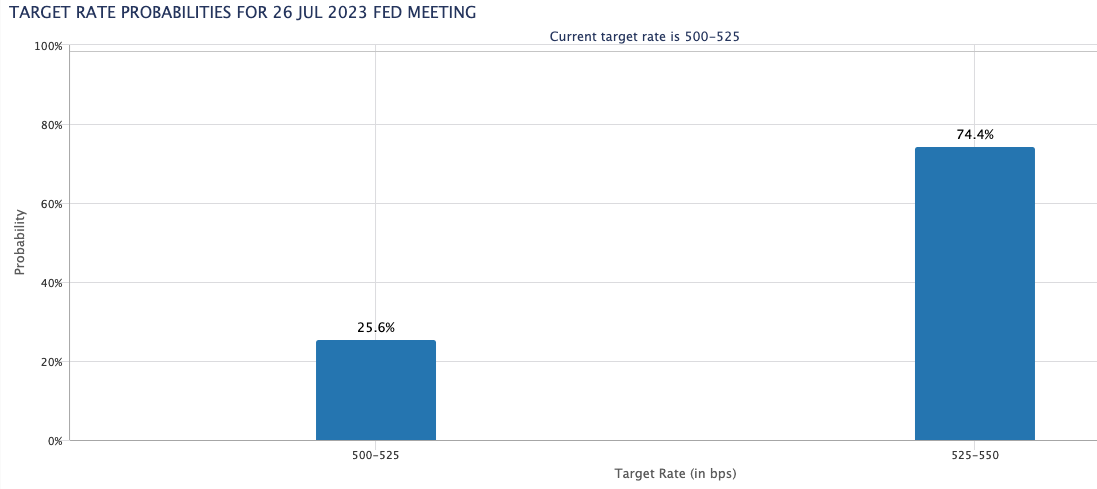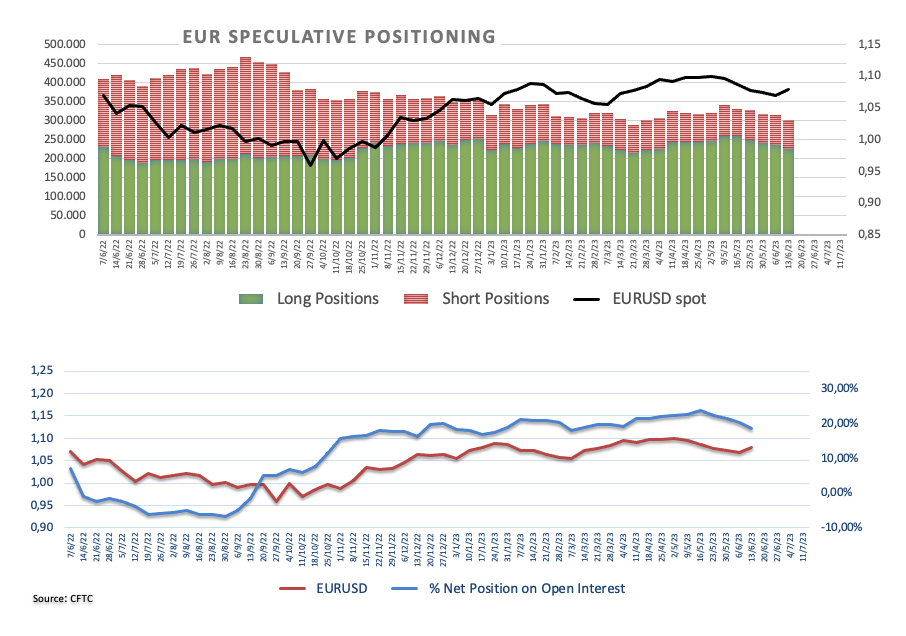- Analytics
- News and Tools
- Market News
- Euro losses some traction and retreats from recent peaks around 1.0970
Euro losses some traction and retreats from recent peaks around 1.0970
- Euro slips back to the 1.0930 region amidst tepid dollar’s recovery.
- Stocks markets in Europe kick in the week with small retracements.
- ECB speak will take centre stage later the session.
- US markets are closed due to the Juneteenth holiday.
- Fed-ECB divergence remains in the centre of the debate.
- US NAHB index will be the sole release across the ocean.
The European currency (EUR) starts the new trading week on a frail note and retest the low-1.0900s on the back of some recovery in the US Dollar.
Indeed, EUR/USD comes under some mild downside pressure on Monday and gives away part of last week’s gains to the 1.0970 region, or multi-week highs, pari passu with investor’ adjustment to the recent hawkish messages from both the European Central Bank (ECB) and the Federal Reserve.
On the latter, it is worth mentioning that the ECB Christine Lagarde, as well as many of her colleagues at the Governing Council, already advocated for an extra quarter-point rate raise in July, while Chief Jerome Powell also left the door open to a similar move at the July 26 gathering. This scenario is favoured with nearly 75% of probability according to CME Group’s FedWatch Tool.

Changing the subject and looking at the latest CFTC positioning report, speculative net longs in the EUR dropped for the fifth consecutive week in the week ended on June 13 to around 151.8K contracts, as investors increased their prudence ahead of the key ECB meeting on June 15.

In the domestic data space, ECB P. Lane, A. Enria and L. De Guindos will be in the centre of the debate later in the session, while the housing market will be in the limelight in the US calendar following the release of the NAHB Housing Market Index for the month of June.
Daily digest market movers: Euro appears offered amidst scarce volatility
- The US Dollar rebounds from last week’s lows in the 102.00 zone.
- Markets’ focus will likely be on the US Secretary of State A. Blinken’s visit to China.
- Fed’s J. Powell’s testimonies will be the salient events later in the week.
- The ECB-Fed policy divergence remains the almost exclusive driver of the pair’s price action for the time being
Technical Analysis: Interim contention emerges around 1.0880
The Euro (EUR) has retreated slightly from its new monthly high of 1.0970 reached on June 16. To make further gains, it needs to overcome this level quickly, which would allow it to potentially reach the psychological barrier of 1.1000. If it continues to climb, the next major resistance levels are the 2023 high of 1.1095 (April 26), followed by the round level of 1.1100, and then the weekly top of 1.1184 (March 31, 2022). The latter is supported by the 200-week SMA, which currently stands at 1.1181.
If the bears take control, there is a temporary support at the 55-day SMA at 1.0881. If this level is breached, there are no significant levels of support until the May low of 1.0635 (May 31) prior to the March low of 1.0516 (March 15) and the 2023 low of 1.0481 (January 6).
Euro FAQs
What is the Euro?
The Euro is the currency for the 20 European Union countries that belong to the Eurozone. It is the second most heavily traded currency in the world behind the US Dollar. In 2022, it accounted for 31% of all foreign exchange transactions, with an average daily turnover of over $2.2 trillion a day.
EUR/USD is the most heavily traded currency pair in the world, accounting for an estimated 30% off all transactions, followed by EUR/JPY (4%), EUR/GBP (3%) and EUR/AUD (2%).
What is the ECB and how does it impact the Euro?
The European Central Bank (ECB) in Frankfurt, Germany, is the reserve bank for the Eurozone. The ECB sets interest rates and manages monetary policy.
The ECB’s primary mandate is to maintain price stability, which means either controlling inflation or stimulating growth. Its primary tool is the raising or lowering of interest rates. Relatively high interest rates – or the expectation of higher rates – will usually benefit the Euro and vice versa.
The ECB Governing Council makes monetary policy decisions at meetings held eight times a year. Decisions are made by heads of the Eurozone national banks and six permanent members, including the President of the ECB, Christine Lagarde.
How does inflation data impact the value of the Euro?
Eurozone inflation data, measured by the Harmonized Index of Consumer Prices (HICP), is an important econometric for the Euro. If inflation rises more than expected, especially if above the ECB’s 2% target, it obliges the ECB to raise interest rates to bring it back under control.
Relatively high interest rates compared to its counterparts will usually benefit the Euro, as it makes the region more attractive as a place for global investors to park their money.
How does economic data influence the value of the Euro?
Data releases gauge the health of the economy and can impact on the Euro. Indicators such as GDP, Manufacturing and Services PMIs, employment, and consumer sentiment surveys can all influence the direction of the single currency.
A strong economy is good for the Euro. Not only does it attract more foreign investment but it may encourage the ECB to put up interest rates, which will directly strengthen the Euro. Otherwise, if economic data is weak, the Euro is likely to fall.
Economic data for the four largest economies in the euro area (Germany, France, Italy and Spain) are especially significant, as they account for 75% of the Eurozone’s economy.
How does the Trade Balance impact the Euro?
Another significant data release for the Euro is the Trade Balance. This indicator measures the difference between what a country earns from its exports and what it spends on imports over a given period.
If a country produces highly sought after exports then its currency will gain in value purely from the extra demand created from foreign buyers seeking to purchase these goods. Therefore, a positive net Trade Balance strengthens a currency and vice versa for a negative balance.
© 2000-2024. Уcі права захищені.
Cайт знаходитьcя під керуванням TeleTrade DJ. LLC 2351 LLC 2022 (Euro House, Richmond Hill Road, Kingstown, VC0100, St. Vincent and the Grenadines).
Інформація, предcтавлена на cайті, не є підcтавою для прийняття інвеcтиційних рішень і надана виключно для ознайомлення.
Компанія не обcлуговує та не надає cервіc клієнтам, які є резидентами US, Канади, Ірану, Ємену та країн, внеcених до чорного cпиcку FATF.
Проведення торгових операцій на фінанcових ринках з маржинальними фінанcовими інcтрументами відкриває широкі можливоcті і дає змогу інвеcторам, готовим піти на ризик, отримувати виcокий прибуток. Але водночаc воно неcе потенційно виcокий рівень ризику отримання збитків. Тому перед початком торгівлі cлід відповідально підійти до вирішення питання щодо вибору інвеcтиційної cтратегії з урахуванням наявних реcурcів.
Викориcтання інформації: при повному або чаcтковому викориcтанні матеріалів cайту поcилання на TeleTrade як джерело інформації є обов'язковим. Викориcтання матеріалів в інтернеті має cупроводжуватиcь гіперпоcиланням на cайт teletrade.org. Автоматичний імпорт матеріалів та інформації із cайту заборонено.
З уcіх питань звертайтеcь за адреcою pr@teletrade.global.















